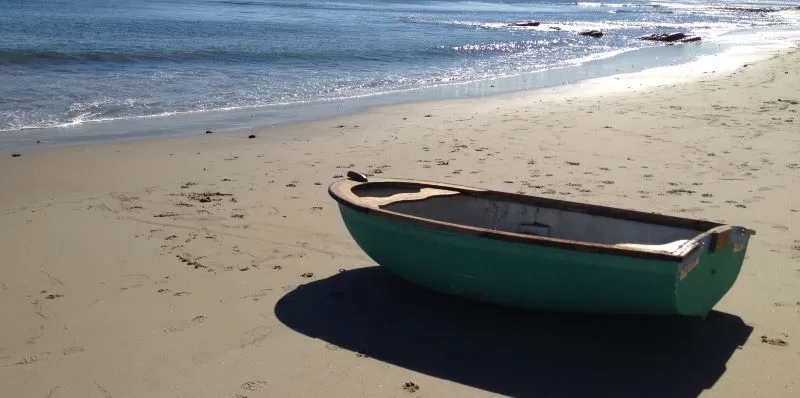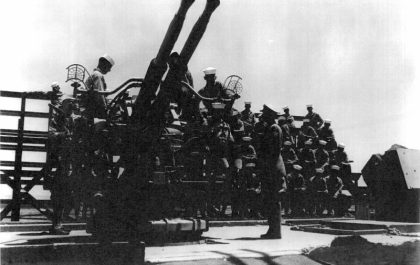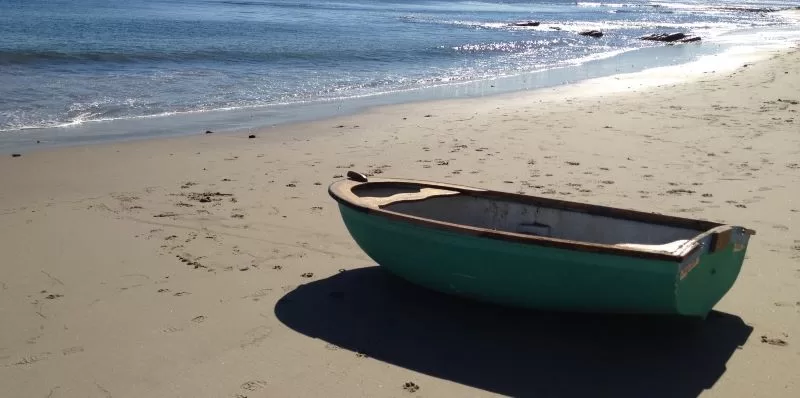
August was sunny and warm. It was nothing like summer in Illinois or any of the other places I had lived. It was dry instead of humid, the nights were cool, never hot except for that one heat spell, and there weren’t even many mosquitos. It rained just once that summer: a sudden dramatic thunderstorm that ended with a rainbow. Other storms didn’t reach us but they sent big waves to the coast. Jessie wasn’t afraid of anything, but even she didn’t want to try her luck on those huge waves. Some of the military guys surfed them, riding on top of mountains of green water all the way to the beach, where they disappeared in a sea of foam.
Jessie and I continued to spend every moment we could at the beach or in the hills, but I remembered what Kitty said about Jacob and did my best to be friendly. He still wouldn’t talk except when spoken to, and not always then, but I thought maybe things were becoming a bit less chilly. It was the piano that finally broke the ice.
No matter what adventures Jessie and I had during the day, I spent every evening that summer practicing the piano and it was paying off. I was getting better. Sometimes, I thought, what I was playing even sounded like music instead of just a lot of mistakes. If the process was painful, Aunt Maddie never let it show. She kept me company in the living room after dinner, reading or writing letters while I practiced.
That evening, I was picking my way through an old show tune from the collection of sheet music that came with the piano. It was a simple, jaunty kind of melody that wasn’t hard to play. Aunt Maddie came over and stood behind me.
“I remember that one!” she said. “It’s from the musical No, No, Nanette. It was the bee’s knees—and possibly also the cat’s meow—back around 1926.” She laughed. “I know, that sounds about as long ago as the last ice age. Play the chorus again James, please?”
I did, and she began to sing along. She had a nice voice, kind of husky and soft and never flat.
“When skies are gray,
And you say you are blue,
We’ll send the sun smiling through.
We want to be happy,
But we won’t be happy,
Till we make you happy, too.”
My Ma used to sing that,” Jacob said from the doorway, startling both of us. I turned around in surprise. He looked like he was hesitating about whether or not to come into the room. I quickly turned back to the music and resumed playing.
“Come join us,” Aunt Maddie invited. “You remember the words, don’t you? Maestro, from the top please!”
Aunt Maddie and I sang the silly little song through from the top. Jacob, half embarrassed, hummed along under his breath. I wasn’t very good at playing and singing, but I didn’t make too many mistakes. Aunt Maddie applauded gallantly when we finished.
“Come sit down, Jacob,” Aunt Maddie invited, gently herding him to the sofa. “Here, take Mouse for a moment.” She scooped the big gray cat up from her own chair, where he had settled himself during the musical interlude, and gently set him next to Jacob. The cat squawked indignantly, but climbed into Jacob’s lap. He automatically put out his good hand to stroke the soft fur.
“Ma liked that song,” Jacob said. “She and Pa went to Dodge City once and saw the show it was from. It was a real show in a theater, live from Broadway. Ma never forgot it. She always liked to sing it. She used to sing it to me when I was little. That was back when things were good.”
“What was it like in Kansas?” I asked. I had stopped playing but was still sitting on the piano bench, afraid to move in case it broke the spell.
“We had a farm,” he said, his attention still focused on the cat. “It was great,” he said. “There were apple trees—big ones you could climb, and wheat fields all around, just like an ocean of growing things, and we had chickens and a cow. But then the drought came and all of our crops and animals turned to dust and there wasn’t any money. We headed west to California like a whole lot of other folks, but there was no work for Okies—that’s what they called us, even though we were from Kansas, not Oklahoma.”
“Did your parents find what they were looking for?” Aunt Maddie asked.
“Pa wasn’t well and then he died,” Jacob’s voice faltered. “Ma and I made it to Los Angeles and for a while things were OK. She got a job and I got to go to school again. We didn’t have very much money, but we managed. And when I was old enough I helped. There’s lots of work doing odd jobs and stuff even for a kid if you’re willing and aren’t picky, but then she died, too, and I was on my own.”
“Do you know if you still have any family in Kansas?” Aunt Maddie asked. Her voice was gentle.
“No, and I wasn’t going to go to an orphanage,” Jacob said fiercely. “I can take care of myself. They sent a social worker out to find me but I ran away. I took the Red Car trolley all the way down to the beach. That was always Ma’s favorite thing to do when we could afford it. We used to go down and sit on the sand and watch the boats go by. When I got to the end of the line I started walking up the coast, away from the city, away from everything.
“That first night I slept on the beach. It was cold and I kept thinking the tide would come up and wash me away. I kept walking the next day and I found a shack no one was using. I was looking for fresh water and followed a creek a little way up from the road. The sun was just right and I saw it reflect off of a window. No one had been there in a long time, not even tramps. It was broken down, but the roof was still good, and there was a spring just a bit farther up. It was good water, not a bit brackish.
“Winter was hard, but I caught fish and gathered mussels and clams and sometimes even lobsters and sold them to the hotels and restaurants along the highway. I didn’t make much, and I was always cold, but I had enough to get by on, and at least there was fish to eat. You can eat most kinds of seaweed, too. Did you know that? An old Greek fisherman taught me that. He gave me some hooks and line, too, and a net for catching lobsters in. I used to find a lot of old fishing tackle at the pier. It’s amazing what people throw away.”
“How did you start selling Indian artifacts?” I asked. “And how did you know where to look for them?”
“That was a bit of luck,” Jacob said. “I met a man who was digging for Indian things one day when I was digging for clams. I’d seen some other sites like the one where he was digging at—places on the beach with big piles of broken shells where artifacts were being washed out by the tide. showed him a soapstone fish I’d found and kept for luck and he offered me five dollars for it right on the spot. That was a lot more than I made all month selling fish. He said he’d pay me for anything I found. After that, I’d bring him things—he would meet me at the pier every first Saturday—and he would buy almost everything I brought.
“I got the idea of checking the library to see if there were records of other sites, and there were lots of articles in the archeology journals. They were tough to read but I got the hang of it, and after a while I got kind of good at knowing where to look for Indian sites.
“I didn’t think it was wrong,” he told Aunt Maddie. “There were never any bones before that last time, just bits of shell and stone tools. Things like the stone fish I sold the man that first day are rare, and often I wouldn’t find anything more than a handful of shell beads, but you get awfully tired of seaweed, and not having anything to eat when the weather’s too bad for fishing, so I kept at it. It was a way to get by. I was planning to sign up for the military when I turned 17 and that’s next month. You can, you know, if you have a letter from a parent or guardian, and Ma wrote me one just before she died.” His voice faltered. “Since the snake bit me I don’t know what to do anymore.”
“You have a home here with us for as long as you need it, Jacob,” Aunt Maddie’s voice was full of sympathy.
“But how can I ever pay you back?” Jacob sounded angry. “I know how much the hospital cost when Ma was sick. And I can’t even do any work to help pay my way.”
“Don’t worry about not being able to work right now,” Aunt Maddie said. “Give yourself time to heal. When you are better we’ll find plenty of work for you to do, but not so much that you can’t go back to school next month. When you are 18 you can decide what you want to do next. I suspect that your injury will keep you from active military service—that snake had other plans for you—but there are many ways to serve, and many other paths to follow. What the snake did was give you choices. That’s a gift, even if it is a painful one.”
Jacob nodded and left the room. Once again I almost missed his muttered “thank you.”
Jacob could still be prickly. There were bad days when his injury must have caused him pain and frustration and he wasn’t always easy to live with, but the ice had started to melt.





